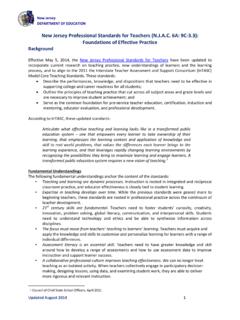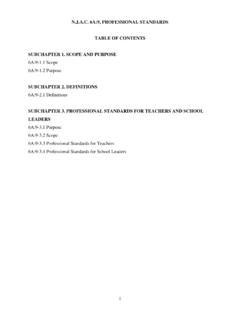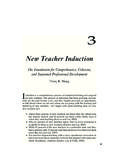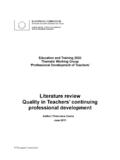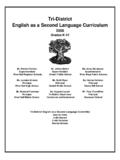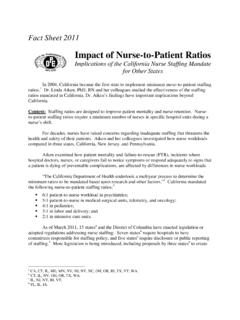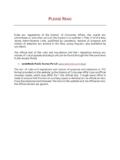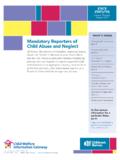Transcription of 65 4 Informative Assessment Changing Classroom …
1 December 2007/January 2008 December 2007/January 2008 | Volume 65 | Number 4 Informative Assessment Pages 36-42 Changing Classroom PracticeMeeting regularly in teacher learning communities is one of the best ways for teachers to develop their skill in using formative WiliamToday's schools face unprecedented challenges in preparing students for the unpredictable demands of the future workplace. In an effort to meet these challenges, a number of policy reforms have focused on raising student achievement. Some (for example, No Child Left Behind) have depended primarily on sanctions, leaving schools and districts to find solutions for themselves.
2 Others have involved curriculum changes, increased use of information technology, or changes in the way schools are governed or organized (for example, charter schools or high school redesign).The evidence to date is that none of these initiatives has had a large effect. When you control for the demographics of student populations, the net impact on student achievement appears to be effectively zero (Wiliam, 2007).Thus, it's hardly surprising that there has been considerable interest in one development that does have a solid body of research showing its effect on student achievement formative Assessment .
3 Five reviews of the research in this area (Black & Wiliam, 1998; Crooks, 1988; Kluger & DeNisi, 1996; Natriello, 1987; Nyquist, 2003) synthesized a total of more than 4,000 research studies undertaken during the last 40 years. The conclusion was clear: When implemented well, formative Assessment can effectively double the speed of student learning (Wiliam, 2007).What happened in response to these findings was predictable. A number of publishers started putting the label "formative" on any Assessment that was designed to be administered more often than once a year. Such a label may be legitimate if the Assessment is used to shape instruction.
4 For example, the results of standards-based tests might show that teachers are paying too much attention to one standard and not enough to another, allowing the teachers to adjust the curriculum. Or the assessments might indicate that certain students are not making enough progress to reach proficiency on the state test, enabling the school to provide extra instruction for these is not legitimate, however, to claim that the existing research indicates that such use of standardized benchmark assessments will raise student achievement (Shepard, 2007). Almost all the research reviewed in the five studies mentioned focused on short- and medium-cycle formative Assessment , in which the length of the feedback cycle was minutes, hours, or days rather than the weeks or months most commercially available assessments require.
5 Although common assessments, benchmark assessments, interim assessments, and the like play an important role in monitoring student progress and providing system-level information for policymakers, there is no evidence at this time that such assessments increase student achievement (Popham, 2006). Instead of putting their faith in such solutions, schools need to implement the kind of formative Assessment that research clearly Right Stuff: Effective Formative AssessmentIn an article in Educational Leadership two years ago, I and some of my colleagues at Educational Testing Service's Learning and Teaching Research Center laid out five nonnegotiable components of an effective formative Assessment system (Leahy, Lyon, Thompson, & Wiliam, 2005).
6 To tap the full potential of formative assessments, teachers must Clarify and share learning intentions and criteria for success with students. For example, some teachers share work samples completed by previous students and have current students discuss which ones are strong and which are weak, and why. Engineer effective Classroom discussions, questions, and learning tasks. Well-planned questions can prompt students to think and provide teachers with information to adjust instruction. Teachers need to use effective questioning techniques that keep all students engaged and that gauge the understanding of the whole class instead of just selected students.
7 Provide feedback that moves learners forward. Comments that address what the student needs to do to improve, linked to rubrics when appropriate, promote further learning more effectively than letter grades do. Activate students as the owners of their own learning. For example, have students assess their own work, using agreed-on criteria for success. Encourage students to be instructional resources for one another. Peer Assessment and feedback is often more acceptable and engaging for students than teacher feedback is. Since we wrote that article, we have worked with hundreds of schools across the United States, and we have learned a great deal about the kinds of supports that are necessary for implementing effective formative Assessment practices.
8 In particular, we have learned that the necessary changes in Classroom practice, although often apparently quite modest, are actually difficult to example, a few months ago, an elementary school teacher in northern New Jersey was telling me about her efforts to change her questioning techniques. She wanted to use popsicle sticks with students' names on them as a way of choosing students to answer her questions at random a technique that increases student engagement and elicits answers from a broad range of students instead of just the usual suspects. However, she was having difficulty calling on specific students because she automatically started most questions with phrases like, "Does anyone know.
9 ?" Frustrated, she wondered why she was finding this simple change so difficult. This teacher has been teaching for 25 years, and we worked out that, over her career, she has probably asked around half a million questions. When you've done something one way half a million times, doing it another way is going to be pretty difficult!That's the bad news. The good news is that, if a school understands just how hard effective formative Assessment is to implement and puts the right supports in place, the necessary changes are achievable in every Classroom . But to bring these changes about, schools need to make sustained investments in a new kind of teacher professional Traditional Professional DevelopmentA football coach who coached quarterbacks by merely having them read books, watch videotapes of games, and listen to presentations from various experts would probably not last long in the job.
10 These practices have a role to play, of course but ultimately, success in quarterbacking is about being able to execute the that is different from knowing how. But in the model of learning that dominates teacher professional development (as well as most formal education), we assume that if we teach the knowing that, then the knowing how will follow. We assemble teachers in rooms and bring in experts to explain what needs to change and then we're disappointed when such events have little or no effect on teachers' practice. This professional development model assumes that what teachers lack is knowledge.

